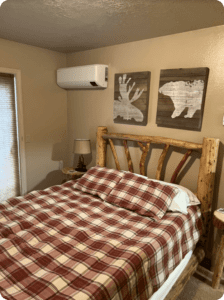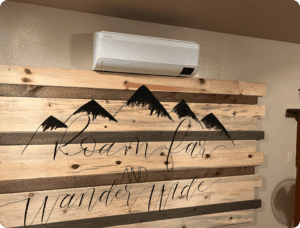What Kind Of Company Do I Call To Install A Mini Split System In My Home?
 A certified HVAC contractor with mini split and heat pump experience is the best choice to install these systems in your home. DIY or having an electrician handle part of the job voids the warranty and leads to poor performance.
A certified HVAC contractor with mini split and heat pump experience is the best choice to install these systems in your home. DIY or having an electrician handle part of the job voids the warranty and leads to poor performance.
It can be tempting to go the DIY route for a mini split in your Eagle, ID home (or anywhere in Metro Boise or Valley County). After all, it seems simple enough. And, the prices you find online are way lower than what a heating and cooling company quotes you.
However, you get what you pay for. And, in many cases, you pay much more later for what you don’t pay for upfront.
What we mean is this: There’s way more involved with a mini split installation than mounting a few air handlers and running lines to a heat pump. Especially if you need more than one mini split or are running multiple air handlers from across the house to one heat pump.
Read More: How Do Mini Splits Work?
In this article, we’ll go over some of the factors you need to consider before trying to do this job yourself. Then, we’ll offer some guidance on finding the best company in your area to do it right.
Do You Need An Electrician To Install A Mini Split?
You’re better off using certified HVAC tech than an electrician to install a mini split. The job involves high-voltage lines, connecting to the circuit breaker, and more. Using an electrician reduces the high risk of injury or property damage. But, it’s still not the best strategy.
Manufacturers always recommend using a certified HVAC contractor for these and other reasons. Certified contractors have the knowledge and expertise to prevent electrical and other problems.
If you’re determined to do a DIY project, however, at least consult an HVAC company or electrician before you start. You need to understand everything about the job first.
Can I Install A Mini Split Myself?
Mini split installation is a job best left to the professionals. With a certified HVAC contractor, you eliminate many risks that can ruin your investment if something goes wrong. Three things to consider before installing your own mini split are:
- Sizing
- Safety
- Warranty
It’s also worth noting that a mini split should last much longer than a conventional furnace and central air. So, making the right investment up front will pay off for years to come.
You’ll more than make up the “extra” money you paid for installation when your system lasts as long as it should, holds its efficiency (meaning you pay less on your electric bill), and doesn’t require extra, expensive, repairs.
Read More: What Is The Cost Of A Mini Split In Boise Metro And Valley County?
Sizing
Here’s what you need to consider when choosing the strength of your heat pump and air handlers:
Load Calculation
Online calculators can use square footage to estimate your home’s tonnage requirements for heating and cooling. But, they can’t replace a professional load calculation for many reasons.
An HVAC contractor also factors in layout, airflow, insulation, the number and location of windows, if any parts of the home are additions, if any rooms are over a garage, and more.
And, a heat pump that’s too big or too small for the house will leave you with hot and cold spots. Excess wear and tear often prevent them from coming even close to their projected service life.
Heating Capacity
Next is the question of whether you’re using the system for air conditioning only, for supplemental heat, or if you expect to keep your home warm all winter with just a ductless system.
These considerations play a huge part in the load requirements. And, they’re a little trickier than with conventional units.
Furnace and central units measure heat in BTUs and cooling in tonnage. But since a heat pump never generates heat, they only list tonnage. So, you need to know all the conversions for the right size.
Number Of Indoor Units
Next is the number of indoor units, or air handlers, you’ll need. Once again, square footage plays a role. But, that’s even less of a factor than it is with the overall load requirements.
Wall-mounted, floor-mounted, and ceiling cassette models all circulate air differently. You choose the best one based on your specific needs.
Are you treating the entire home? Or just one or two problem areas? Are these large or small rooms? Do they have high or vaulted ceilings?
Do they have doors, and do you usually keep them open or closed? Does air flow from one room to another — say, from a small kitchen to a dining room?
And, have you measured everywhere you plan to mount the units and run the linesets? Not only should you know what the mini split will look like in your home. You should also ensure that the condensate lines will drain properly and that the refrigerant lines don’t run so long that they lose pressure.
Your HVAC contractor takes these factors and others into consideration. Not only to find the ideal models but also to determine the best spots to mount them. Even the right model in the wrong place won’t work the way it should.
Safety
We already mentioned the risks of doing electrical work yourself. But, the risks don’t end there. And, many problems can take months or years to show up. Once they do, they may be costly and invasive to fix.
For instance, air handlers have condensate lines that drain water during dehumidification. Mold behind walls is a real problem when those lines aren’t installed properly. Then you get slow, silent water leaks in places you can’t see.
Or, what would happen if a 40-pound air handler fell off a wall and hit someone? Or if you fell off a ladder installing a line casing down the side of your home?
Even if you’re handy, it’s best to leave this to a licensed and insured company. The money you might save doing it yourself can be gone in an instant.
Warranty
 Finally, read the fine print on your system’s warranty: Manufacturers don’t honor any claims for parts and repair if a certified contractor didn’t install the system.
Finally, read the fine print on your system’s warranty: Manufacturers don’t honor any claims for parts and repair if a certified contractor didn’t install the system.
Without that paperwork, you have to pay for every problem out of pocket — even if it’s clearly due to faulty equipment or manufacturing issues.
How To Choose An HVAC Contractor To Install Your Mini Split
Two important things to look for when choosing an HVAC contractor to install a mini split are an excellent reputation and documented experience with mini splits and heat pumps.
Read Real Case Studies Of Mini Split Installations In Boise Metro and Valley County
Excellent Reputation
Look for a company with a physical address in your area that’s done work in your town for years. Recommendations from friends and family are always valuable, and you can ask them for references, too.
Check a contractor’s Google reviews and BBB rating. If they don’t have dozens of five-star reviews or have many one-star entries, they may not be up to the task.
And, check for multiple BBB complaints about the same issues, even if they have an A+ rating. You don’t want to deal with a business that will make the process harder, even if they fix it in the long run.
Experience With Mini Splits
Finally, remember that mini splits are different from conventional furnaces and central air. You want a company that specializes in heat pumps and mini splits. They should also be certified to work with major mini split brands.
These include Mitsubishi, Daikin, Carrier, Fujitsu, and Samsung. They don’t have to have them all, but they should at least hold a certification for the brand you want.
Read More: Rebates and Financing Options For Treasure Valley Heat Pump and Mini Split Installations
Heat Pump And Mini Split Installation In Eagle, ID
Snowflake Air specializes in heat pump and mini split installations in Eagle, ID along with homes and businesses across Boise Metro and Valley County. We have an excellent reputation and are certified to work on Mitsubishi, Daikin, Carrier, and all major heat pumps brands. Click below or call (208) 205-9078 for your free consultation.



